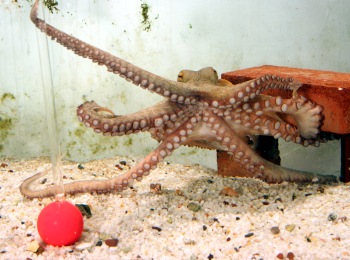New research on octopuses sheds light on one of the most mysterious puzzles in neurology

A new study on octopuses sheds light on the question of how the brain stores information and retrieves memories, says Prof. Benny Hochner from the Department of Neurobiology at the Alexander Silverman Institute of Life Sciences and the Center for Neural Computing at the Hebrew University.
"Octopuses are considered the most intelligent invertebrates, because they have a relatively large brain, and they can learn things and remember them for a long time," says Prof. Hochner. "You can even compare the complexity of their behavior and their ability to learn and remember to that of vertebrates, even though they are invertebrate molluscs whose brains are much simpler than that of vertebrates." This unique combination of complex behavior and a simple brain was used by Prof. Hochner to reexamine one of the most interesting questions in the field of neurology: how does the brain store information and retrieve memories?
In a previous study, Hochner and his colleagues discovered that in the area responsible for learning and remembering in the octopus brain, a process called LTP (long-term potentiation) takes place, in which the connections between nerve cells are strengthened following intense activity in those connections (synapses). According to Prof. Hochner, "the LTP process that was discovered in the octopus is remarkably similar to that found in the brains of vertebrates."
In the current study, the researchers wanted to find out what the role of the LTP process is in creating memories. The explanation is that it is the connections between the neurons that are active at the time of certain learning that are strengthened, because the LTP process only occurs in connections that operate at a high intensity. ''For example, when we memorize something,'' explains Prof. Hochner, ''we repeatedly activate the same connections, thus activating the LTP mechanism that strengthens exactly these connections. The process can be described as: 'memory burning' in the nerve cell networks that store long-term information.''
In an article recently published in the journal Current Biology, Prof. Hochner, research student Tal Shumerat, and Prof. Graziano Fiorito from the Anton Dorn Zoological Center in Naples, describe how they tested this assumption on the brains of octopuses. The researchers used electrical stimulation that triggered an artificial LTP process and thus blocked the octopus brain's ability to use LTP during learning. When this technique was applied near the time of training the octopuses for a certain task, the next day the octopuses did not remember the task well.
These findings support the hypothesis that LTP plays an important role in the memory formation process. The fact that this was discovered in invertebrates suggests that the LTP process is a universal mechanism that also occurs in animals as evolutionarily distant as octopuses from humans.
Prof. Hochner emphasizes that even after this discovery, it is still not entirely clear how exactly the LTP process participates in storing memories and retrieving them. "In this respect, the research on octopuses may shed light on the subject," says Hochner, "because thanks to the relatively simple brain of the octopus, it is easier to learn how the learning and memory system is organized."
For example: it is known that memory is usually divided into short-term memory, which is effective for minutes or hours, and long-term memory, through which you can remember important facts for days, weeks, and even a lifetime. Hochner's research shows that, as in humans and other mammals, the octopus's brain is also divided into two parts, one responsible for short-term memories and the other for long-term memories.
It's not entirely clear how the two parts work together, if at all. However, the form of organization in the octopus demonstrates a sophistication not seen in other animals: the two parts work simultaneously, but not independently. In the octopus, the part responsible for long-term memory also controls the rate at which the part responsible for short-term memory acquires memories. "This regulatory mechanism is probably beneficial to the octopus when it is required to learn at a higher speed," says Hochner, "for example in emergency and risk situations."

5 תגובות
I would be happy to receive Tal Shamrat's email address, I am interested in receiving more information thanks to his research...
Qantas:
Nostradamus was born by you.
You make so many points in one short response it's really amazing.
what did you say?
To the point and to me…
Maybe if you happen to read the book..the musings and wits for...2012-2013 ..Saar Publishing.-you will get insights on the subject...
It turns out that the mind is a matter..serious and sensitive..much more than we assume, and its use is subtle..
Turn to the entry, the crisis in education...
And the solutions..the additional ones immediately...
Enjoy..the summer..and the freedom of the spirit.
Perhaps the electrical stimulation the octopus received simply prevented it from concentrating and learning.
Therefore, maybe the conclusion is wrong...
The matter is very far from being explained